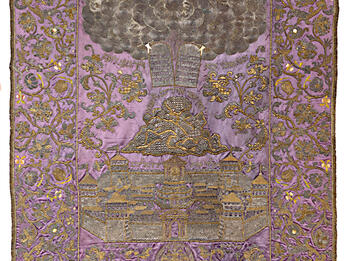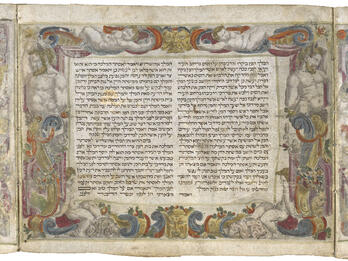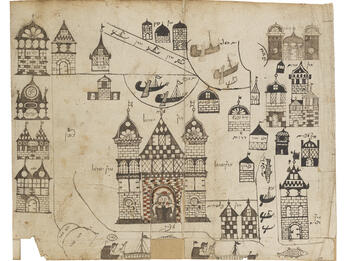Consolaçāo às tribulações de Israel (Consolation for the Tribulations of Israel)
Samuel Usque
1553
27. Portugal. Year 5253 [1493]. When My Children Were Sent to the Lizards
[ . . . ] The Portuguese king, eager to find some logical excuse to vex me, called for an investigation to see if the number of my people who had entered his kingdom exceeded the stipulated six hundred families. Since the haste with which my children had left Castile did not…

Related Guide
Birth of an Idea: Defining the Early Modern Period
The emergence of the early modern period (1500–1750) in Jewish history is relatively recent and complex.
![M10 622 Manuscript, probably from Ukraine]. Manuscript probably from Ukraine, c. 1740 with a broad collection of practical kabbalah and mystical magic. Facing page manuscript arranged vertically with Hebrew text in the shape of a figure wielding two long objects.](/system/files/styles/entry_card_sm_1x/private/images/vol05/Posen5_blackandwhite166_color.jpg?h=cec7b3c9&itok=Sz6u21MQ)
Related Guide
Defining Trends of the Early Modern Period
Paradoxically, both centrifugal forces (expulsions, migrations creating global dispersion) and centripetal trends (Hebrew printing, kabbalah) unified Jews in the early modern period.

Related Guide
Early Modern Italy: Where East and West Meet
Ashkenazim, Sephardim, and Marranos encountered each other in Italian cities, developing community structures that later influenced Jewish communal organization throughout the western world.
Creator Bio
Samuel Usque
Not much is known of Samuel Usque beyond a passage in his Consolação às tribulações de Israel (Consolation for the Tribulations of Israel) in which he describes himself as coming from a family of Portuguese New Christians of Spanish descent. He is thought to have been born in the early sixteenth century in Lisbon to a family originally from Huesca, Spain, and to have visited Salonika and Safed before settling in Ferrara, Italy, in the middle of the century. Usque was fluent in various languages and well-versed in classical, biblical, Jewish, and Christian literature. His sole work, written in the form of a Renaissance pastoral dialogue, appeals to New Christians to return to Judaism. It is cast in the form of a dialogue among three shepherds, one of whom, Ycabo (the Jewish people), recounts the history and tribulations of the Jewish people. The other two represent memory and consolation, respectively. The text, which he dedicated to Doña Gracia Nasi, provides insight into the contemporary reality as well as Usque’s personal experiences. Scholars consider Consolation for the Tribulations of Israel to be a significant work of both Jewish historiography and Portuguese literature. Most copies of the first edition (Ferrara, 1553) were destroyed by the Inquisition.
You may also like
Divre ha-yamim le-malkhe Tsarefat u-vet Otoman ha-Togar (Chronicle of the Kings of France and the Ottoman Empire)
Crónica de los reyes otomanos (Chronicle of the Ottoman Kings)
Emek ha-bakhah (Valley of Tears)
Shalshelet ha-kabalah (The Chain of Tradition): History of Late Antiquity
Tsemaḥ David (The Sprout of David): Introduction to the Second Part



